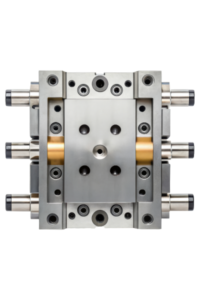CNC machining can help you produce parts from any kind of plastic or metal. Due to this reason, there is a wide range of materials with which you can do CNC machining. To decide which will be the best for your application, you need to think about which of the CNC machining materials will be best for your use. Because of this, we have listed the top CNC machining materials that you can check out.
CNC machining has become a popular manufacturing process across various industries. One of the important decisions that engineers and designers have to make is selecting the right material for their CNC machining project. In this article, we will discuss the best materials for CNC machining and the factors to consider when selecting the right material.
-
Aluminum Aluminum is the most commonly used material for CNC machining due to its cost-effectiveness, good weldability, formability, corrosion resistance, and ability to be machined quickly. It can be used in various applications such as medical devices, shafts, gears, aircraft fittings, consumer electronics, and healthcare.
-
Stainless steel Stainless steel is a strong and corrosion-resistant material that is suitable for non-marine grade fittings, gears, bolts, nuts, and shafts. However, some limitations need to be considered, such as its inability to be cold-formed, heat-treated, or welded. Engineers must take special care with feeds, speeds, and tool sharpness when cutting during CNC manufacturing.
-
Titanium Titanium is a revolutionary material that is lightweight, strong, tough, and corrosion-resistant. It is best for aggressive conditions and is commonly used in the medical, military, industrial, and aerospace sectors. Its alloys are extensively useful due to their good metallurgical structure, creep resistance, and superior strength. Titanium is also popular as a consumer product.
-
Plastics Plastics such as Polypropylene (PP), PVC, Acrylics (PMMA), Acetal, Polycarbonate (PC), and Nylon are easily machinable and suitable for applications that need corrosion resistance, less friction, and transparency of weight. Plastics offer benefits such as impact strength, cost-effectiveness, dimensional stability, and good flame resistance. They can be used in automotive, bearings, insulators, electrical insulation, medical, and aerospace industries.
-
Carbon steel Carbon steel is an affordable material that is stronger and tougher than stainless steel. It is easily machinable and weldable, and manufacturers can heat treat or harden it to get different degrees of hardness. It is suitable for small and strong mechanical parts, nuts, gears, connecting rods, bolts, and shafts, and architectural applications.
-
Brass Brass is a non-magnetic material that is used to create components that need electrical conductivity and strength applications. Brass parts enhance the visual appeal while offering considerable strength. It is cost-effective and easy to use for CNC machining. It is corrosion-resistant and has low friction and is suitable for medical equipment, electrical hardware, plumbing, engineering, and consumer goods.
-
Copper Copper is a good thermal and electrical conductor. While pure copper is not suitable for CNC machining due to its high malleability and ductility, copper alloys are easier to machine and have comparable electrical and thermal properties.
Factors to consider when selecting the right CNC machining material
-
Material requirements: Consider thermal, mechanical, and material requirements, surface finishing, and cost.
-
Candidate materials: Identify candidate materials that meet most of the design requirements.
-
Priority: Determine which design requirement is most important, such as cost or mechanical performance.
In conclusion, selecting the right material for CNC machining is critical for a successful project. The best material to use depends on the specific application and requirements of the project. The materials listed above are among the best for CNC machining and offer unique characteristics that can be suitable for different uses.

